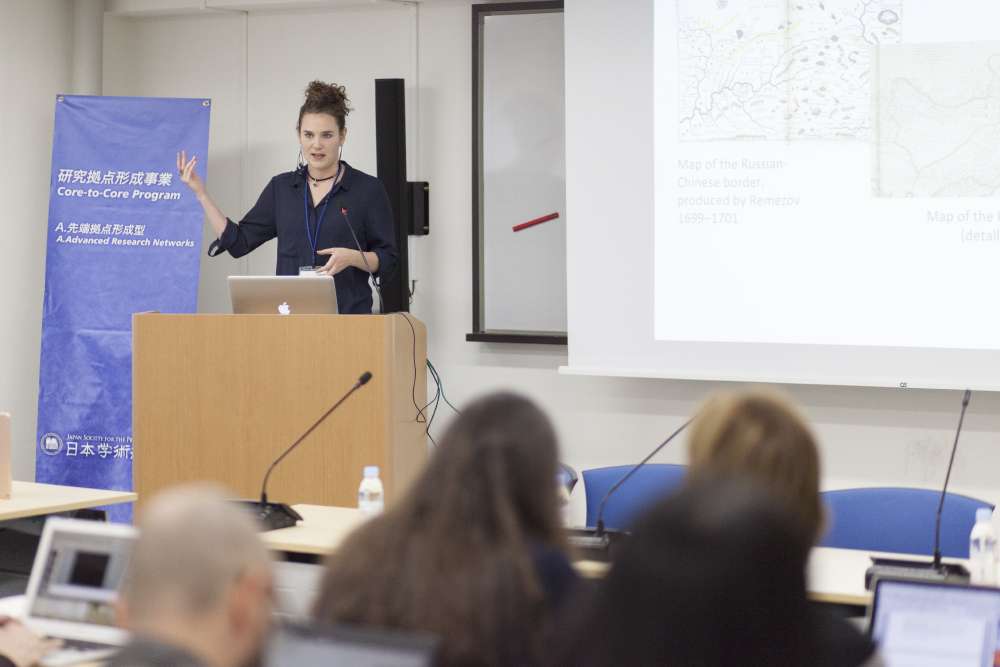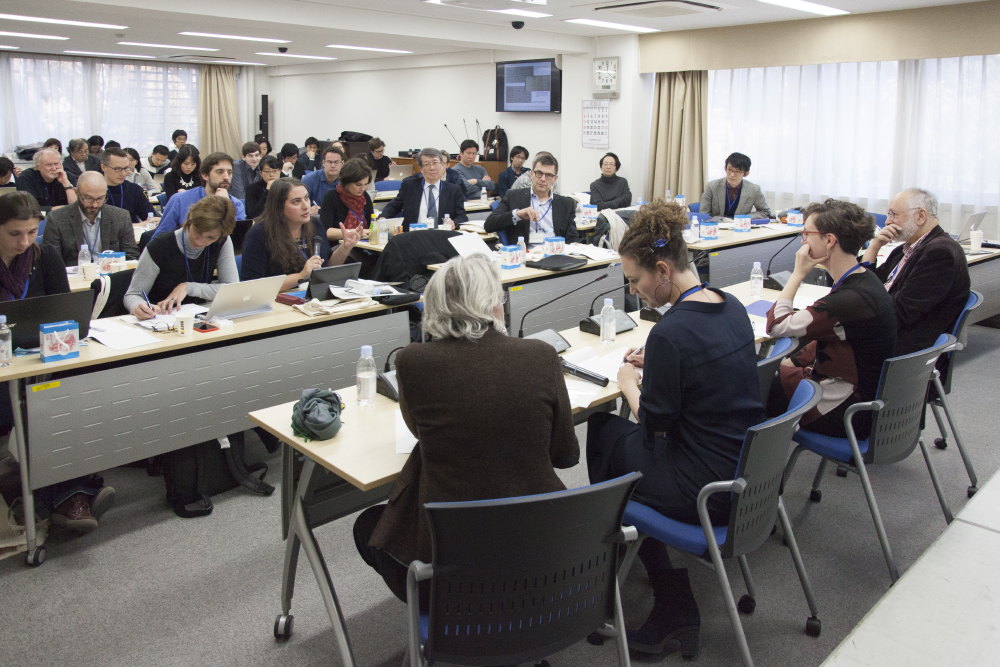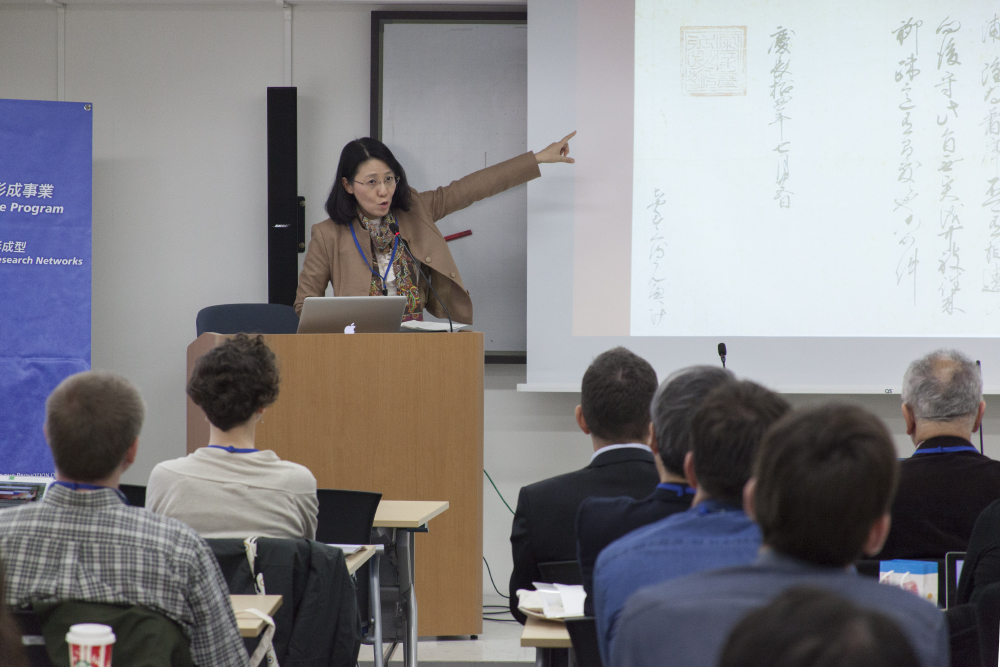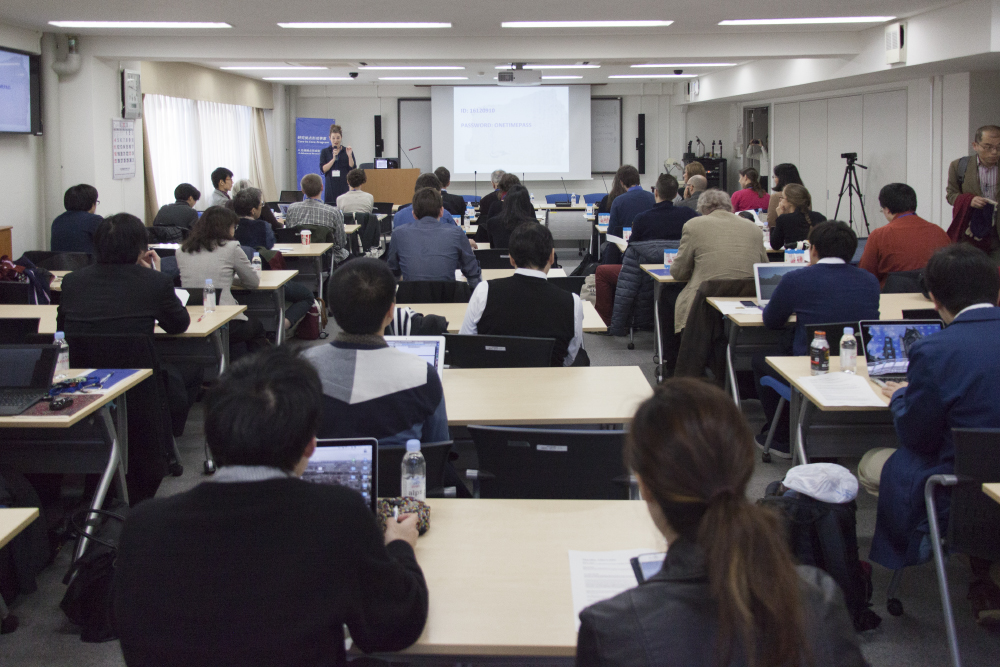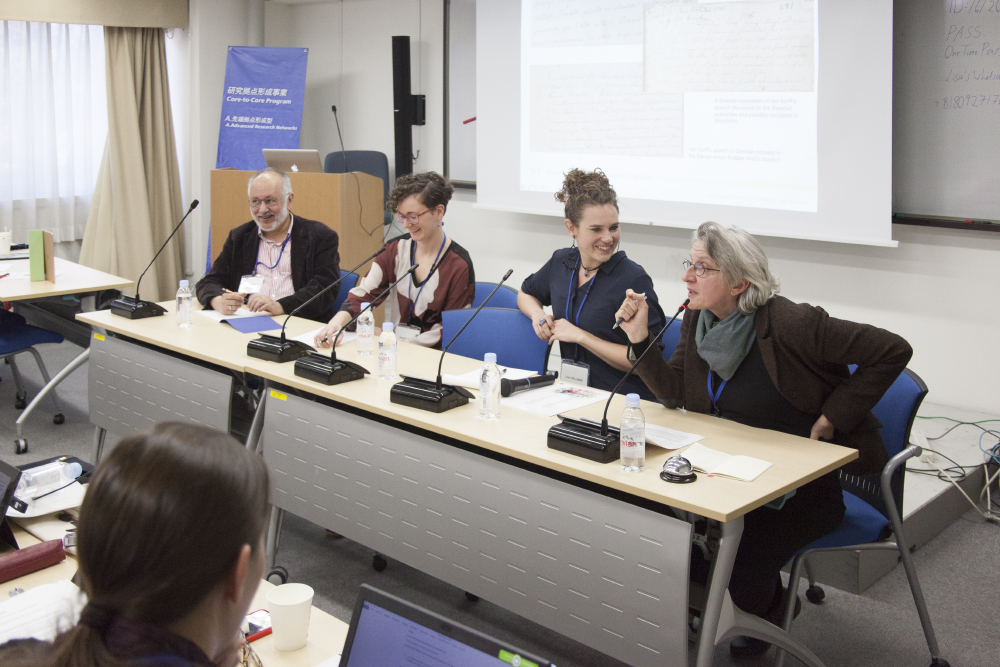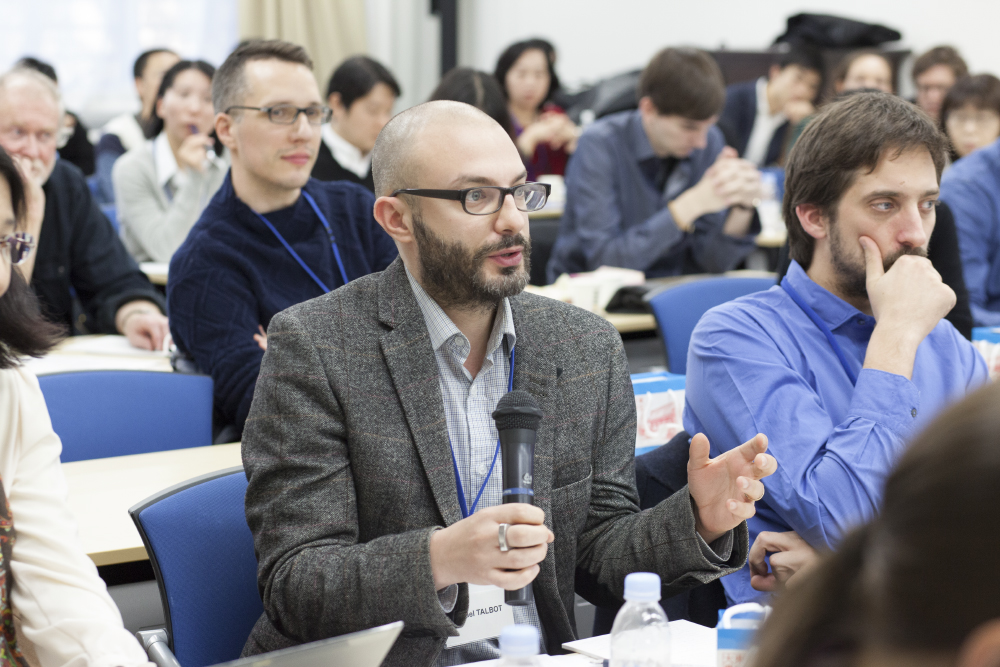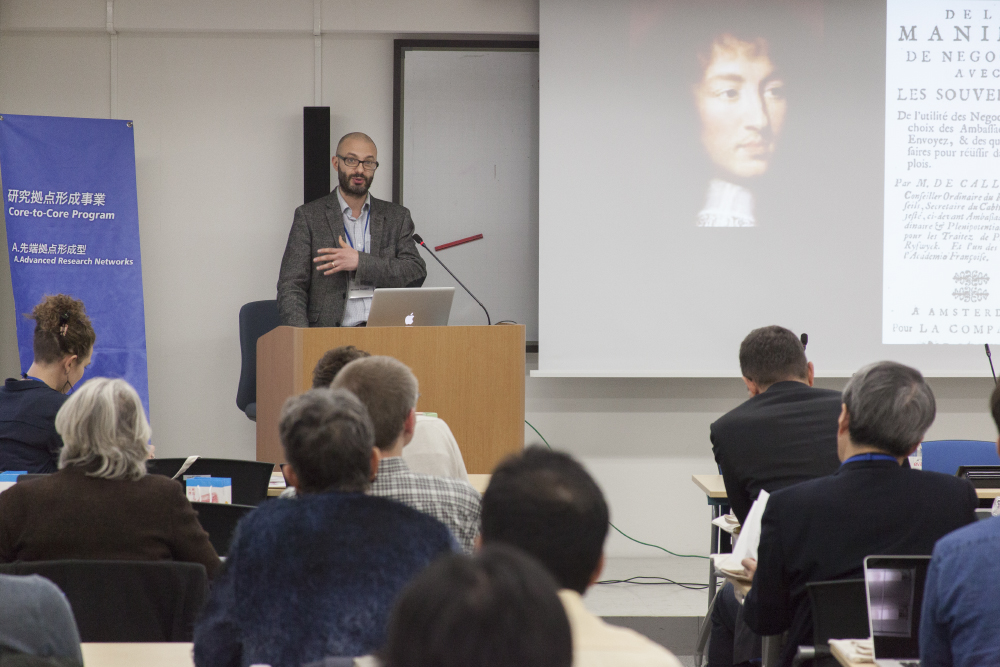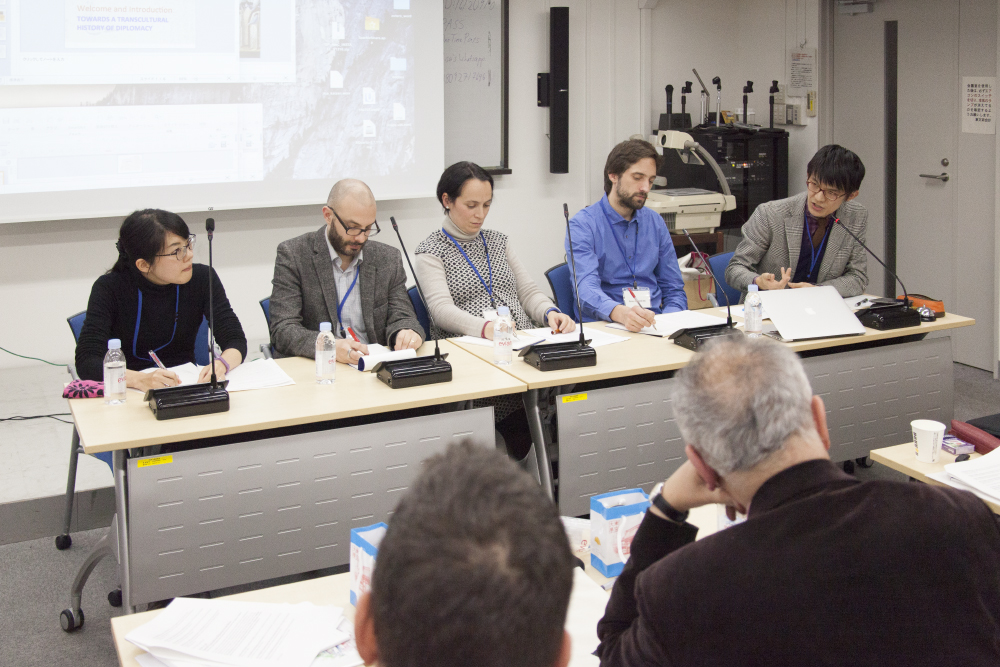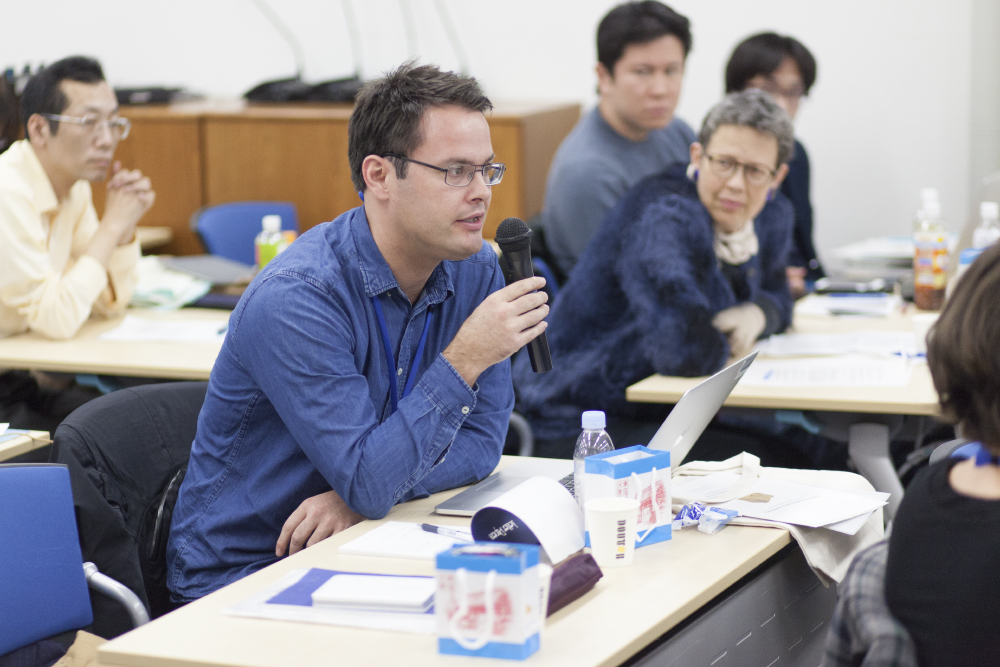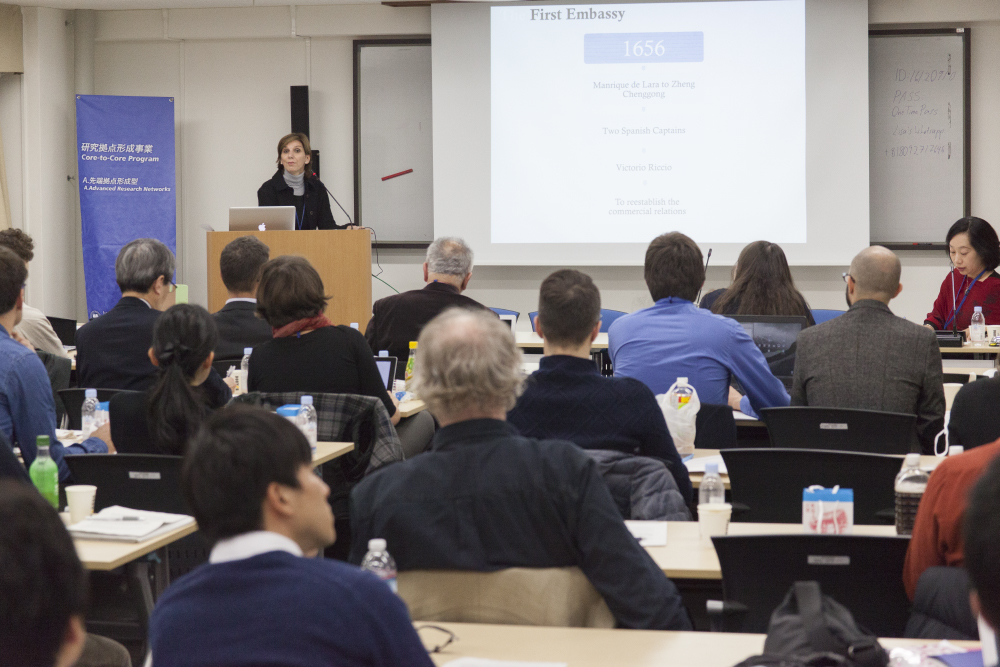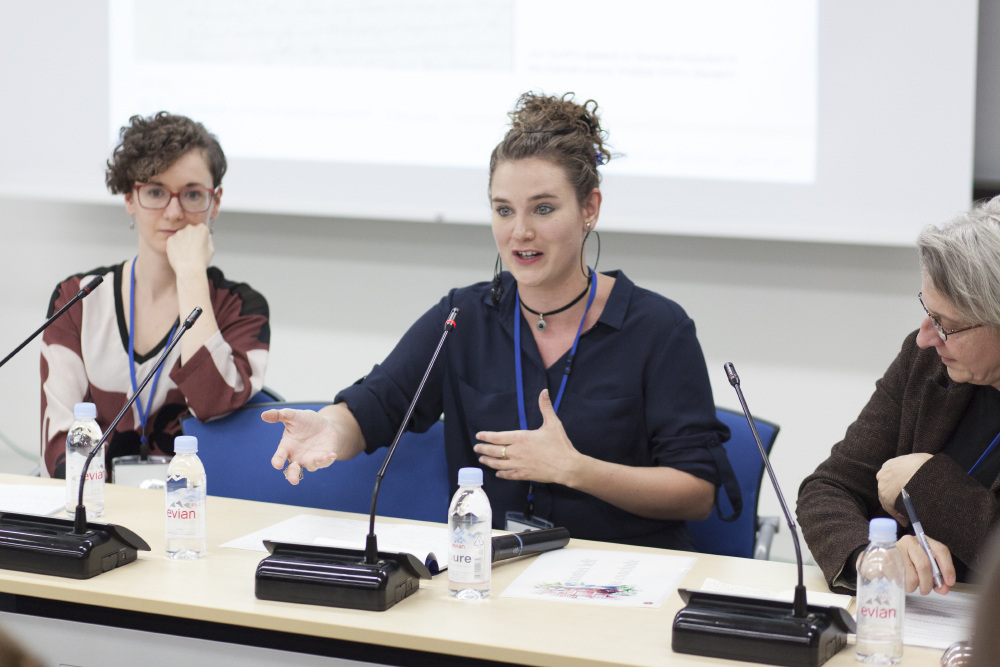2017.01.13
GHC Workshop" Towards a transcultural history of diplomacy "
2016年12月9日から11日、東京大学東洋文化研究所において、ワークショップTowards a transcultural history of diplomacyが開催された。今回のワークショップは、グローバル・ヒストリー共同研究拠点プロジェクトの一環として、Lisa HellmanとBirgit Tremml-Wernerが企画を担当した。日本と欧州数カ国から中堅の研究者や大学教員が集い、3日間にわたって新しい外交史のさまざまなテーマについて議論した。時代的には初期近代(19世紀を含む)に焦点を当て、地理的にはアジア、ヨーロッパ、アフリカに重点がおかれた。
事前に2つの目的が設定された。第1に、歴史編纂の方法を伝統的に異にする研究者間の対話を深める。第2に、知識の普及や研究のためにより適切な、広く受け入れられる用語を見いだすために、参加者が用語・言語上の課題を認識しうる場とする。
ワークショップでは6つのテーマでパネルディスカッションが行われ、いずれも外交の文化史をめぐる近年の研究テーマにアプローチするものであった。加えて、用語上の課題について公開討論会が行われた。ワークショップ全体をとおして、研究報告においても刺激的な討論においても言語の多様性が強調され、翻訳と知識発信を重視する必要性が強調された。これまで翻訳と知識発信によって、外交への理解と帝国をめぐる言説が形成されたからだ。多数の非エリート・アクターの存在、また、トランスソーシャルなアクターの多元的な活動やアイデンティティが既定のテーマと認識されるようになった経緯が繰り返し議論されるなか、外交慣行の比較研究の必要性も強く提起された。
2016年12月9日
松方冬子氏(東京大学史料編纂所)が基調講演を行い、近世の外交関係への比較アプローチや異文化アプローチを目指す意欲的な研究を概観した。徳川日本の外交関係におけるオランダ東インド会社とオランダの事例を基に、条約が進貢関係にとって代わったという、日本外交史の通説を批判的に考察した。そして、近世外交関係を文書外交と外交官外交に分けて考える革新的なカテゴリー化を提唱し("Letter Diplomacy vs. Diplomats Diplomacy”)、文書外交の柔軟性を強調するとともに、近代以前の異文化間外交への理解に関する2つの異なる世界観を文書外交は架橋しうると述べた。さらに、外交関係と貿易統制には密接な関係があるとし、進貢関係に代わって条約が制定されたとする見方に異を唱えた。
パネルI(Information Networks and Communication)では、多様な外交アクターによる特定の情報入手や言語の使用が、アジアやヨーロッパのさまざまな異文化状況における二国間・多国間コミュニケーションにどう影響したかが議論された。
進行:Antonella ROMANO(フランス社会科学高等研究院)
Kapil RAJ (フランス社会科学高等研究院), Portuguese as a Multiway Diplomatic Language between Malabar Kingdoms and Europeans in the 17th and 18th Centuries
Lisa HELLMAN (東京大学), Drawing the Line: Intercultural Interactions in the Mapping of the Central Asian Borderlands
Sophie HOLM (ヘルシンキ大学), ‘…the King answers by himself in Swedish’ – The Languages of Diplomacy in 18th Century Sweden
パネルII(The Role of Symbolism and Ceremonies)では、特定の儀式的・象徴的な行為手段に焦点を当て、名目上外交関係の枠内で流通する物品の重要性や価値に反映される社会・文化的力学について議論した。
進行:山本浩司(東京大学)
Remi DEWIERE (パリ第1大学), ‘Ismael begged Osman to give him a few christians’, Diplomatic Gifts and Economic Negotiations between Tripoli and the Borno Sultanate (16th-17th C.)
Michael TALBOT (グリニッジ大学), Negotiators, not Diplomats: Ambassadors and the Notion of Friendship in Ottoman-British Relations
Carla TRONU (京都大学), Religion and Early Modern Intercultural Diplomacy between the Iberian Kingdoms and Japan
松居宏枝 (お茶の水女子大学), How to Discuss ‘Japanese history’ in a Global Context?: Using Diplomatic Contacts in Germany for the Empress Shoken’s Western Court Dress
パネルIII(Transcultural Diplomacy from Below)では、19世紀以前において非エリート・アクターが地理的・政治的・文化的に異なる国家間の外交関係をどのように形成したかについて議論した。
進行:佐野真由子(国際日本文化研究センター)
Joachim OSTLUND (ルンド大学), Swedish ransom diplomacy in Ottoman North Africa, 1650-1800
Sari NAUMAN (ヨーテボリ大学), Farmer and Diplomat – Towards a Broadening of Concepts in Early Modern Time
Ana BUSQUETS (カタルーニャ・オープン大学), Different Aims, different Embassies: Fujian and Manila Seventeenth Century Diplomatic Contacts
Felicia GOTTMANN (ダンディー大学), Glocal Politics and Transcultural Diplomacy: A Prussian East Indiaman in 1750s Cape Verde
2016年12月10日
パネルIV(Transcultural Treaty Making and Legal Aspects)は異文化間の条約締結をテーマとし、統治や力関係の意味および概念の違いが法的概念の理解にどのような支障をもたらしたのかについて議論した。
進行:Robert ESKILDEN (国際基督教大学)
福岡万里子 (国立歴史民俗博物館), Comparing Japanese and Chinese Diplomacy of the Transitional Period from Early Modern to Modern: Treaty-Negotiations in 1860-61 with the Prussian Embassy
Michael FACIUS (ベルリン自由大学), Whose country? Satsuma Diplomatic Culture in the Anglo-Satsuma War
塩谷哲史 (筑波大学), Reconsideration of the Treaty of Kulja (1851): Imperial Russian Diplomacy in a Eurasian Context
パネルV(Conflicting Actors)では、さまざまなアクター間の外交交渉の手段と動機について、さらにはそうした行為に加え商業利益と国益の衝突が国際法のより広範な発展に及ぼした影響について議論した。
進行:島田竜登 (東京大学)
Dorothee GOETZE (ボン大学), On behalf of the Dynasty: Swedish and Hessian-Kassel Relations in the 1720s
Catia ANTUNES (ライデン大学), Dutch-Portuguese Diplomatic Encounters, 1640-1703: Exchanges, Sovereignty and ‘World Peace’
Leos MULLER (ストックホルム大学), Conflict between Diplomacy and Mercantile Interest. Sweden’s Neutrality and Shipping c. 1650-1820
Carl FEDDERSEN (アグデル大学), Diplomatic Models and Modes of Interpretation in Transcultural Diplomacy: The Case of VOC and Makassar Interaction 1637-1668
パネルVI(Conflicting Diplomatic Ideas)は16・17世紀の外交上の概念と慣行に焦点を当てた。イベリア人と東アジア人の異文化外交に関する具体的なエピソードを紹介し、多様な考え方がどのように扱われ、新たな対外的文脈に転移されたかを議論した。
進行:太田淳 (慶応大学)
Birgit TREMML-WERNER (チューリヒ大学), Emblematic Moments in Early Modern Hispano-Japanese Diplomatic Exchange
Csaba OLAH (国際基督教大学), Reshaping of traditional diplomatic patterns in 16-17th century China and Japan
パネルVII(A Common Terminology?)はグローバルな外交用語を探ることを目的として設けられた。この実験的セッションは、原史料の言語における用語を学術用語と照らし合わせた際に生じる用語の不一致や課題について議論を深めようとした。参加者は特に重要または問題ありと思われる用語を挙げ、それらをもとに、初期近代の外交関係の用語について討論した。
ワークショップ3日目の12月11日は国立歴史民俗博物館を訪れた。案内役は福岡万里子氏が務めた。見学後、今後の共同研究の可能性について討論し、ワークショップを終了した。
From 9 to 11 December 2016 a workshop entitled “Towards a transcultural history of diplomacy” was held at the Institute for Advanced Studies at the University of Tokyo. The workshop was organized by Lisa Hellman and Birgit Tremml-Werner, as part of the core-to-core global history collaborative. During these days, mid-career scholars and professors from Japan and several European countries gathered to address various themes of a new history of diplomacy with a focus on the early modern period including the nineteenth century. The geographical focus of the workshop papers lay on Asia, Europe and Africa.
Two aims were defined beforehand. First, to establish a profound dialogue between scholars of different historiographical traditions and, second, to tap the potential of the participants’ awareness of terminological and linguistic challenges for the sake of finding a more appropriate, broadly accepted language for dissemination and research.
The workshop covered six thematical panels, each of them zooming in on a certain trope of recent research agendas of a cultural history of diplomacy and ended with an open discussion forum on terminological questions. Throughout the workshop both paper presentations and stimulating discussions emphasized language diversity and the necessity to stress translation and dissemination processes as they shaped diplomatic understanding and imperial discourses until today. While the recurring focus on the multitude of non-elite actors and how plural tasks and identities of trans-social actors came to be recognized as an already well-established theme, workshop participants also raised a strong plea for working comparatively on diplomatic practices.
9 December 2016
In her keynote speech, Matsukata Fuyuko (The University of Tokyo, Historiographical Research Institute) outlined challenging positions towards a comparative or transcultural approach to early modern diplomatic relations. Based on the example of the VOC and the Dutch in Tokugawa Japan’s foreign relations, she critically examined the long standing argument in Japanese diplomatic history that tributary was replaced by treaty. Instead, she suggested an innovative categorization of early modern foreign relations into provisional letter diplomacy and permanent residence diplomacy (“Letter Diplomacy vs. Diplomats Diplomacy”), stressing the flexibility of letter diplomacy and its ability to bridge the gap between two different world views as to understanding pre-modern transcultural diplomacy. In addition, she emphasized the close links between diplomatic relations and the control of foreign trade, while objecting the tributary relations were simply replaced by treaties.
Panel I (Information Networks and Communication) analyzed how diverse diplomatic actors’ access to certain information and language use affected bi- and multilateral communication in different Asian and European transcultural settings.
Discussant: Antonella ROMANO (École des hautes études en sciences sociales)
Kapil RAJ (École des hautes études en sciences sociales), Portuguese as a Multiway Diplomatic Language between Malabar Kingdoms and Europeans in the 17th and 18th Centuries
Lisa HELLMAN (The University of Tokyo), Drawing the Line: Intercultural Interactions in the Mapping of the Central Asian Borderlands
Sophie HOLM (University of Helsinki), ‘...the King answers by himself in Swedish’ – The Languages of Diplomacy in 18th Century Sweden
Panel II (The Role of Symbolism and Ceremonies) focused on specific means of ceremonial and symbolic actions and discussed socio-cultural dynamics reflecting in the materiality and value of objects and commodities as they circulated nominally within diplomatic exchange.
Discussant: YAMAMOTO Koji (The University of Tokyo)
Rémi DEWIÈRE (Université Paris 1), ‘Ismael begged Osman to give him a few christians’, Diplomatic Gifts and Economic Negotiations between Tripoli and the Borno Sultanate (16th -17th C.)
Michael TALBOT (University of Greenwich), Negotiators, not Diplomats: Ambassadors and the Notion of Friendship in Ottoman-British Relations
Carla TRONU (Kyoto University), Religion and Early Modern Intercultural Diplomacy between the Iberian Kingdoms and Japan
MATSUI Hiroe (Ochanomizu Women’s University), How to Discuss 'Japanese history’ in a Global Context? Using Diplomatic Contacts in Germany for the Empress Shōken’s Western Court Dress
Panel III (Transcultural Diplomacy from Below) specifically focused on how non-elite actors shaped pre-nineteenth-century foreign relations between geographically, politically and culturally separate entities.
Discussant: SANO Mayuko (International Research Center for Japanese Studies)
Joachim ÖSTLUND (Lund University), Swedish ransom diplomacy in Ottoman North Africa, 1650–1800
Sari NAUMAN (Gothenborg University), Farmer and Diplomat – Towards a Broadening of Concepts in Early Modern Time
Ana BUSQUETS (Universitat Oberta de Catalunya), Different Aims, different Embassies: Fujian and Manila Seventeenth Century Diplomatic Contacts
Felicia GOTTMANN (University of Dundee), Glocal Politics and Transcultural Diplomacy: A Prussian East Indiaman in 1750s Cape Verde
10 December 2016
Panel IV (Trans-cultural Treaty Making and Legal Aspects) looked at trans-cultural treaty making and how semantic and conceptual differences of rulership and power relations challenged the understanding of legal concepts.
Discussant: Robert ESKILDEN (International Christian University)
FUKUOKA Mariko (National Museum of Japanese History), Comparing Japanese and Chinese Diplomacy of the Transitional Period from Early Modern to Modern: Treaty-Negotiations in 1860-61 with the Prussian Embassy
Michael FACIUS (Freie Universität Berlin), Whose country? Satsuma Diplomatic Culture in the Anglo-Satsuma War
SHIOYA Akifumi (University of Tsukuba), Reconsideration of the Treaty of Kulja (1851): Imperial Russian Diplomacy in a Eurasian Context
Panel V (Conflicting Actors) addressed the means and motivations behind diplomatic contacts between actors of differing ranks, as well as the impact of such practices and clashes between commercial and state interests on the broader development of an international law.
Discussant: SHIMADA Ryuto (The University of Tokyo)
Dorothée GOETZE (Bonn University), On behalf of the Dynasty: Swedish and Hessian-Kassel Relations in the 1720s
Cátia ANTUNES (Leiden University), Dutch-Portuguese Diplomatic Encounters, 1640-1703: Exchanges, Sovereignty and ‘World Peace’
Leos MÜLLER (Stockholm University), Conflict between Diplomacy and Mercantile Interest. Sweden’s Neutrality and Shipping c. 1650-1820
Carl FEDDERSEN (Agder University), Diplomatic Models and Modes of Interpretation in Transcultural Diplomacy: The Case of VOC and Makassar Interaction 1637-1668
Panel VI (Conflicting Diplomatic Ideas) focused on diplomatic concepts and practices in the sixteenth and seventeenth centuries. Introducing concrete episodes of transcultural diplomatic contacts between the Iberians and East Asians it showed how diverse ideas were handled and translated into foreign and new contexts.
Discussant: OTA Atsushi (Keio University)
Birgit TREMML-WERNER (University of Zurich), Emblematic Moments in Early Modern Hispano-Japanese Diplomatic Exchange
Csaba OLÁH (International Christian University), Reshaping of traditional diplomatic patterns in 16-17th century China and Japan
Panel VII (A Common Terminology?) was set out to search for a global vocabulary of diplomacy. This experimental session was designed to reflect on terminological inconsistencies and the challenges arising when confronting original terms in the languages of the source material with the language of academia. Workshop participants were asked to single out terms as being particularly crucial or problematic, and use them as a basis for a general discussion on the terminology of early modern diplomatic contacts.
The workshop ended with an excursion to the National Museum of Japanese History (Rekihaku) on 11 December 2016, where a final discussion on possibilities how to collaborate in the future followed a guided tour by Fukuoka Mariko.









